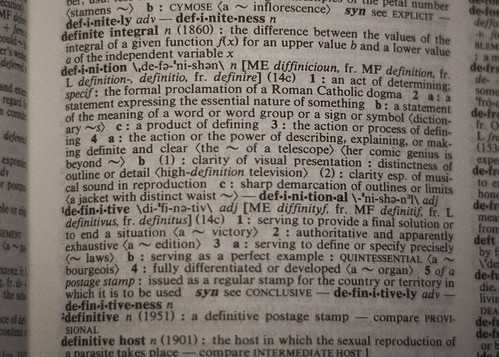This blog post was a post I made on a discussion on Linked-In - I thought it was worth sharing to open some more discussion. The discussion was about the difference between Knowledge and Information - that perennial topic which goes on and on, and still goes nowhere!
What I was trying to do in this post, is suggest that the debate is driven by assumptions, and that assumptions can influence definitions if you are not careful.
It is an open debate how closely knowledge is linked to information, and therefore how valid constructs such as DIK are.
If you define Knowledge as something based on Information ("knowledge is information plus context", "Knowledge is information that allows us to take action", "knowledge is information plus processing") then you are already making an assumption about the link between the two.
This assumption of a link leads to a second assumption that you manage knowledge in the same way as information - through libraries, databases, information bases, knowledge bases, or repositories.
Personally I think there is an equally valid model - that knowledge is something you APPLY to information in order to be able to interpret information; that knowledge is a function of experience; that knowledge is more closely related to understanding and to insight than it is to information. (This model was the more popular model in a recent Linked-in poll)
This leads you then to realise that the majority of knowledge is carried by people, and lives in heads and in networks, rather than in libraries, databases, information bases, knowledge bases, or repositories. Management of knowledge therefore becomes as much or more about the management of people and their interaction, than it becomes about the management of files and documents.
So if you want to avoid putting assumptions into your definition (always a good thing to avoid!), then my suggestion is to avoid any definitions of Knowledge which include the word Information.





6 comments:
Great post! Will never use the word information in my defination of KM.
To understand the difference between knowledge and information one should first appreciate the value of the individual. That’s the problem nowadays.
Together with the development of the Internet, we’ve lost the trust in other people’s abilities.
I’ve heard lately such a sentence “Dad, what you could tell me, what I couldn’t find in the Internet?”
Such a person is unable to understand the value of what other people could know.
He doesn’t simply understand what “knowledge” means. He believes only in written (or rather displayed) information. Displaying is a kind of authorization of a value. Spoken words have no authorization.
As a consequence is that the understanding of what the knowledge really means is more difficult that understanding of differential calculus.
And I’m afraid, it’s a rule today. Can it be fixed? I don’t know.
KM tries to rebuild what we, as a society have lost, and I really admire its work, but it’s more than Sisyphus work. However I trust this is feasible.
Thanks for this article, Nick. It made me think.
Hi,
Have a look here: https://docs.google.com/document/d/1DyQVw_mklKIRN8oVdhMc06KqG8vTnyVzxBirxiwdfDY/edit
Best, Jaap
Nick, I get your point, but do you not consider the facts that I remember knowledge? How would you differentiate between the facts I know and the experience I remember?
John, here we enter an area compounded by the deficiencies of the English Language as I explain here http://www.nickmilton.com/2011/07/knowledge-management-term-lost-in.html
Other languages have two words; one of which means "intimate knowledge, knowledge as capability, know-how", the other means "knowledge of facts, rote knowledge, know-what". Savoir and Connaitre in French, Kennen and Wissen in Germany, Kunne and Vite in Norwegian, and so on.
Yes, in English we class "recall of facts" as "knowledge". However the knowledge of value to an organisation is knowledge that transfers capability, which is "Know-how" ("Savoir faire" in French).
If you focus on facts and ignore the know-how, then KM makes small gains by helping people find facts more quickly. If you address the know-how, then KM makes massive gains by increasing organisational capability.
The point I wanted to make in the blog post is that if we use a definition of knowledge that talks only of information, then we focus only on half the meaning held in the English word. We focus on the facts not the know-how, or on the Connaitre not the Savoir, and we focus on the less valuable half. Let's not restrict ourselves that way.
Thanks for the reply Nick. That's a great article, it should be required reading for all English speaking KMs!
Post a Comment